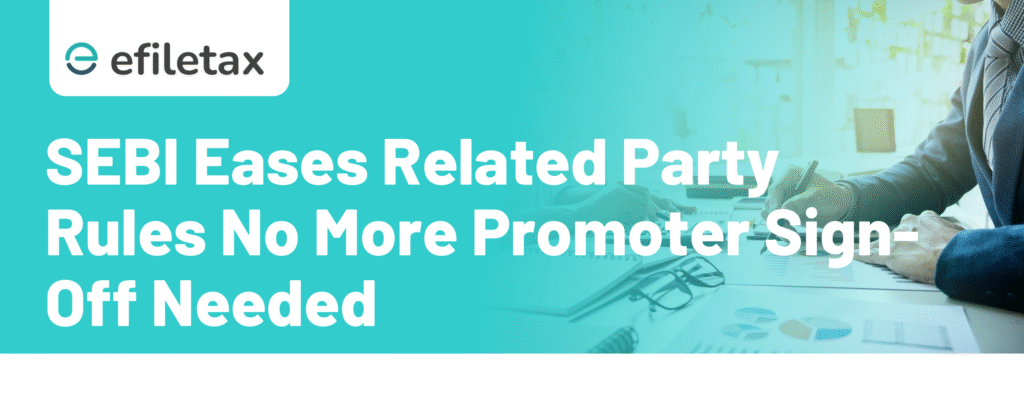
SEBI Related Party Transaction Rules Simplified What You Need to Know
SEBI related party transaction rules have been simplified in 2025 to improve transparency and ease of compliance for listed companies. The changes remove redundant promoter certifications and shift the responsibility of confirming fairness to the top officials of the company. This article breaks down the key updates and what they mean for investors, directors, and compliance teams.
What Has SEBI Changed in RPT Compliance?
SEBI (Securities and Exchange Board of India) has introduced amendments that simplify the compliance process for related party transactions (RPTs) under the SEBI (LODR) Regulations, 2015.
Here are the key changes:
| Old Requirement | New Rule (2025 Update) |
|---|---|
| Promoter or promoter group had to certify RPTs as fair and in the best interest of shareholders | Certification by CEO and Audit Committee Chairperson instead |
| Valuation reports or external audit justifications often remained internal | Companies must now provide the valuation report to shareholders via QR code or web link in the meeting notice |
| Limited visibility for minority shareholders | New provisions enhance transparency and support informed voting |
What Are Related Party Transactions?
Under SEBI LODR, a related party transaction involves any deal or arrangement between the listed entity and its promoters, directors, key management personnel, or entities related to them.
Examples include:
- Loans or guarantees to group companies
- Sale or purchase of goods/services to promoter-controlled entities
- Lease or rental agreements with relatives of board members
Legal Reference
These changes are part of the SEBI (Listing Obligations and Disclosure Requirements) (Second Amendment) Regulations, 2024, notified on SEBI’s official website.
📄 Read the Official Notification
They aim to align disclosures with global best practices and shift accountability to current decision-makers instead of legacy promoter networks.
Why This Matters for Indian Companies
- Reduced promoter dependency: Many new-age companies don’t have traditional promoters. The update reflects the changing business landscape.
- Better investor confidence: Shareholders get direct access to valuation documents, helping them make better voting decisions.
- Streamlined board governance: Audit Committees and CEOs now formally take responsibility for RPT fairness.
Expert View: Tip for Compliance Teams
“Companies must ensure that the valuation reports or fairness opinions are uploaded on their websites well in advance and that the QR codes are functional and accessible. This is now a regulatory mandate, not just a best practice.”
Steps to Ensure Compliance
Here’s a quick checklist for listed companies:
- ✅ Ensure CEO and Audit Committee Chairperson are aware of their new responsibility
- 📥 Obtain a valuation report or fairness opinion for material RPTs
- 🔗 Upload the report on the company website with a working QR code or URL
- 📨 Share this link in the shareholder meeting notice
- 📋 Maintain board meeting minutes where this certification is recorded
Summary
SEBI has simplified related party transaction rules in 2025 by removing the promoter certificate requirement. Now, CEOs and audit committee heads must certify RPT fairness, and companies must provide valuation reports to shareholders via QR codes or website links.
Frequently Asked Questions (FAQs)
Q1. Do all RPTs require a valuation report?
Only material RPTs (as defined by SEBI norms) require independent valuation or fairness opinions.
Q2. Is the QR code mandatory?
Yes, SEBI now mandates that valuation reports be accessible to shareholders via QR code or web link in the notice of general meeting.
Q3. Can promoter certification still be given?
It’s optional, but no longer a regulatory requirement. The onus is now on current management.
🔗 Internal Link
📚 Also Read: SEBI’s Crackdown on Insider Trading – Latest 2025 Cases
Final Words
With these changes, SEBI is putting governance in the hands of those who actively run the company — not just those who founded it. For listed entities, it’s time to update board protocols, investor communication formats, and RPT evaluation systems.